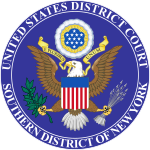Precedents
and rulings | | Supreme Court | - Wheaton v. Peters (1834)
- Baker v. Selden (1879)
- Trade-Mark Cases (1879)
- Burrow-Giles Lithographic Co. v. Sarony (1884)
- Banks v. Manchester (1888)
- Callaghan v. Myers (1888)
- Bobbs-Merrill Co. v. Straus (1908)
- White-Smith Music Publishing Co. v. Apollo Co. (1908)
- Williams & Wilkins Co. v. United States (1975)
- Sony Corp. of America v. Universal City Studios, Inc. (1984)
- Feist v. Rural (1991)
- Campbell v. Acuff-Rose Music, Inc. (1994)
- Quality King v. L'anza (1998)
- Eldred v. Ashcroft (2003)
- MGM Studios, Inc. v. Grokster, Ltd. (2005)
- Costco Wholesale Corp. v. Omega, S. A. (2010)
- Golan v. Holder (2012)
- Kirtsaeng v. John Wiley & Sons, Inc. (2013)
- American Broadcasting Cos., Inc. v. Aereo, Inc. (2014)
- Star Athletica v. Varsity Brands (2017)
- Fourth Estate v. Wall-Street.com (2019)
- Georgia v. Public.Resource.Org, Inc. (2020)
- Google LLC v. Oracle America, Inc. (2021)
- Andy Warhol Foundation v. Goldsmith (2023)
|
|---|
| Appeals courts | - Berlin v. E.C. Publications, Inc. (2d Cir. 1964)
- Roth Greeting Cards v. United Card Co. (9th Cir. 1970)
- Eltra Corp. v. Ringer (4th Cir. 1978)
- Walt Disney Productions v. Air Pirates (9th Cir. 1978)
- Midway Manufacturing Co. v. Artic International, Inc. (7th Cir. 1983)
- Apple Computer, Inc. v. Franklin Computer Corp. (3d Cir. 1983)
- Fisher v. Dees (9th Cir. 1986)
- Whelan v. Jaslow (3d Cir. 1986)
- Vault Corp. v. Quaid Software Ltd. (5th Cir. 1988)
- Rogers v. Koons (2nd Cir. 1992)
- Computer Associates International, Inc. v. Altai, Inc. (2d Cir. 1992)
- American Geophysical Union v. Texaco, Inc. (2nd Cir. 1995)
- Dr. Seuss Enters., L.P. v. Penguin Books USA, Inc. (9th Cir. 1997)
- Itar-Tass Russian News Agency v. Russian Kurier, Inc. (2d Cir. 1998)
- Sony Computer Entertainment, Inc. v. Connectix Corp. (9th Cir. 2000)
- Nunez v. Caribbean Int'l News Corp. (1st Cir. 2000)
- A&M Records, Inc. v. Napster, Inc. (9th Cir. 2001)
- Veeck v. Southern Building Code Congress Int'l (5th Cir. 2002)
- Kelly v. Arriba Soft Corp. (9th Cir. 2002 / 2003)
- In re Aimster Copyright Litigation (7th Cir. 2003)
- NXIVM Corp. v. Ross Institute (2d Cir. 2004)
- BMG Music v. Gonzalez (7th Cir. 2005)
- Bill Graham Archives v. Dorling Kindersley, Ltd. (2nd Cir. 2006)
- Blanch v. Koons (2nd Cir. 2006)
- Perfect 10, Inc. v. Amazon.com, Inc. (9th Cir. 2006)
- Cartoon Network, LP v. CSC Holdings, Inc. (2nd Cir. 2008)
- Ahanchian v. Xenon Pictures, Inc. (9th Cir. 2010)
- Penguin Group (USA) Inc. v. American Buddha (2d Cir. 2011)
- Monge v. Maya Magazines, Inc. (9th Cir. 2012)
- Viacom International, Inc. v. YouTube, Inc. (2d Cir. 2012)
- Seltzer v. Green Day, Inc (9th Cir. 2013)
- Authors Guild, Inc. v. Google, Inc. (2d Cir. 2015)
- Lenz v. Universal Music Corp. (9th Cir. 2015)
- Naruto v. Slater (9th Cir. 2018)
|
|---|
| Lower courts | |
|---|
|
|---|

